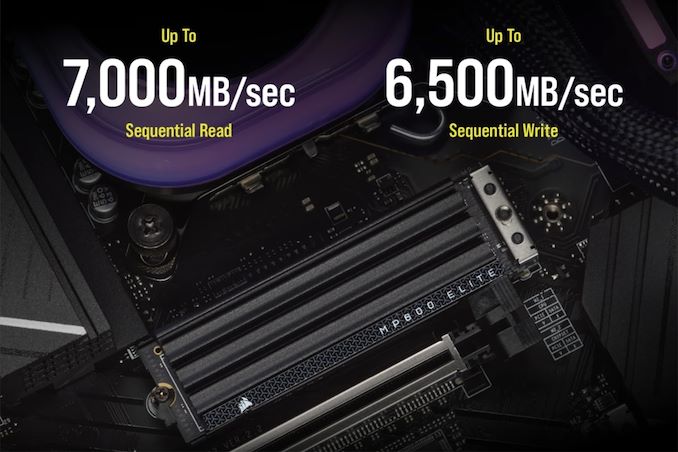While enthusiasts are now focused mostly on SSDs with a PCIe 5.0 interface, there are many people who will be just fine with drives featuring a PCIe 4.0 interface to upgrade their PlayStation 5 or PCs bought a few years ago. To address these customers, SSD makers need to offer something that offers the right balance between price and performance. This is exactly what Corsair does with its MP600 Elite devices.
Corsair this week has released a new line of SSDs aimed at the mainstream market, the MP600 Elite. The drives are based on Phison’s low-power highly-integrated PS5027-E27T platform, which is geared towards building mainstream, DRAM-less drives. The controller supports both 3D TLC and 3D QLC NAND flash via a four channel, Toggle 5.0/ONFi 5.0 interface, with data transfer rates up to 3600 MT/s. Meanwhile host connectivity is provided via a PCIe 4.0 x4 interface.
With its MP600 Elite SSDs, Corsair is not trying to offer the fastest PCIe Gen4 drives on the market, but rather attempts to offer the maximum value for 3D TLC-powered 1 TB, 2 TB as well as 4 TB configurations. The drives will offer sequential read performance of up to 7,000 MB/s and write performance of up to 6,500 MB/s, as well as random read and write speeds of up to 1,000K and 1,200K IOPS respectively, which is not bad for a PCIe Gen4 SSDs.
To maximize compatibility of its MP600 Elite drives (and make it compatible with Sony’s PlayStation 5 and PlayStation 5 Slim), Corsair offers them both with a tiny aluminum heatspreader and an even thinner graphene heatspreader.
The main idea behind the Corsair MP600 Elite is its affordability: it does not require DRAM or a sophisticated cooling system, which optimizes the manufacturer’s costs. Meanwhile, Corsair offers 1 TB MP600 Elite SSD with a graphene heatspreader for $89.99 and 2 TB MP600 Elite SSD with a graphene heatspreader for $164.99 (whereas versions with an aluminum heatsink are $5 cheaper), which is not particularly cheap. For example, a faster Corsair MP600 Pro LPX 2 TB costs $169.99.
Every drive is comes with a five-year warranty and can endure up to 1,200 terabytes written (TBW).



